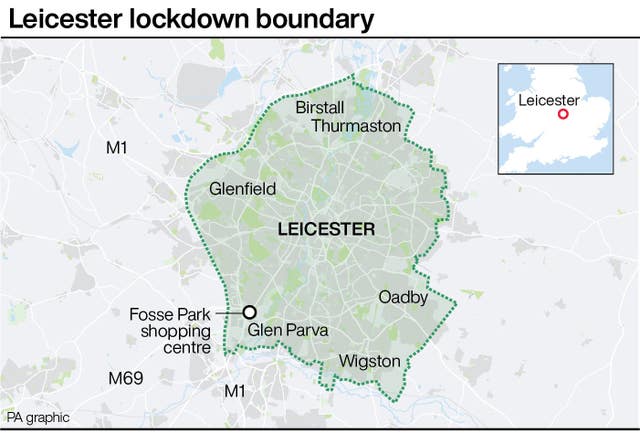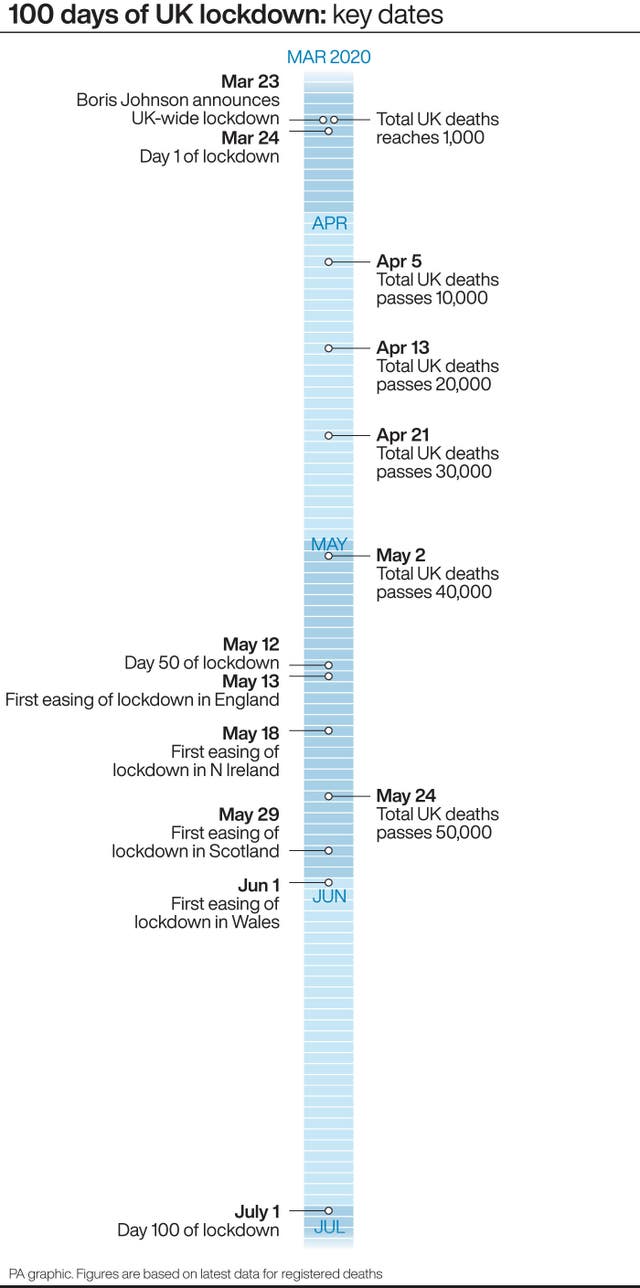It is an “illusion” that the UK is past the worst of the Covid-19 epidemic, a leading scientist has warned amid fears that other towns and cities could follow Leicester into lockdown.
Professor Neil Ferguson, from Imperial College London – who quit as a government adviser after admitting breaking lockdown rules – said the UK should be braced for regional flare-ups.
It comes amid criticism of the way Public Health England (PHE) and the government are handling data on coronavirus cases, with accusations of long delays in sharing figures with regional public health experts.
A PHE regional map for testing across England shows the towns and cities suffering high numbers of cases.
The data covers all mass testing in England, including that carried out in NHS and PHE labs (known as pillar one), plus all community testing, drive-throughs and tests sent to people’s homes (pillar two).
The map shows that the worst affected regions (with at least 45 cases per 100,000 people in the week to 21 June) are Leicester – which went into further lockdown on Tuesday – Barnsley, Bradford and Rochdale.
There are six areas in the next worst affected category (30-44.9 cases per 100,000), which are Bedford, Blackburn with Darwen, Tameside, Oldham, Kirklees and Rotherham.

Prof Ferguson told BBC Radio 4’s Today programme the UK was not over the worst and said the country was “relatively blind” in late February and early March over how much infection there was in the community.
“We were, in retrospect, one of the most heavily seeded countries with infection in Europe,” he said.
“I would say, before we make international comparisons though, just bear in mind we are still very early into this pandemic – there’s a bit of an illusion out there that somehow we are past the worst.
“In this country we’ve probably had no more than 8% of the population infected.
“This is far from over, so I think lessons can be learned from what happened in the UK up to now, but I would prefer to focus on getting the next six months right before looking back in earnest.
“It’s inevitable we will (have further local outbreaks), we are relaxing lockdown rules and that means that contacts in the population are going up and that’s a very variable process.”
Prof Ferguson said there is a window of a few weeks to resolve “teething problems” in how data is shared, to have systems up and running for the scheduled full return of schools in September in England.
It comes after the British Medical Association (BMA) said the government needs to be “more open and transparent with local Covid-19 data” and on how spikes will be dealt with.
Prof Ferguson said: “I think we have not a huge amount of time but a few weeks now to resolve those teething problems and get the data systems in place and get the modes of operation between local and national government working well, because we will desperately need them to work efficiently from September onwards.”
He said PHE and others were “doing their best”, adding: “It’s a very complex system to combine data from multiple sources from across the whole country.
“I don’t think we have any time to lose but I’m not going to sit here and start criticising people at the moment.”
Mayor of Greater Manchester Andy Burnham said the new PHE data raised questions for the government.
He tweeted: “The biggest of all is this: why did they give the go ahead for the big re-opening on 4 July when they could clearly see what was happening in Leicester?”
This graph begs a lot of questions. The biggest of all is this: why did they give the go ahead for the big re-opening on 4th July when they could clearly see what was happening in Leicester? pic.twitter.com/jfMhvNrCBP
— Andy Burnham (@AndyBurnhamGM) July 1, 2020
Labour MP Yvette Cooper said health authorities in her constituency in Wakefield, West Yorkshire, had been trying to get hold of pillar two testing data but had not been able to.
She tweeted: “Our local public health teams, council, NHS doctors & managers in Wakefield have had to fight for months to try to get this data.
“In public health crisis, most important thing is knowing where infection is. Appalling & incomprehensible that basic info hasn’t been provided.
“The idea this could have been Ministerial choice rather than failure of competence is even more shocking. What on earth is going on?”
Chris Ham, former chief executive of the King’s Fund, wrote in the British Medical Journal that the UK could become more like Germany “where regional and local leaders have played a significant role in limiting the impact of Covid-19 on the public’s health”.
“Local leaders, including devolved governments and elected mayors, are much better placed than the Westminster government to engage their communities in limiting and responding to future outbreaks,” he said.

In other developments:
– Turkey’s ambassador to the UK said he is expecting the nations to form an air corridor exempting travellers from quarantines.
– The Trump administration has bought virtually all stocks for the next three months of the drug remdesivir – shown to work against Covid-19.
– The government is to establish a new “office for talent” in an effort to boost the economy by attracting leading scientists and researchers to the UK after the Covid-19 crisis.
– Researchers have said frailty is as important as age or underlying health issues in determining the risk of people dying from coronavirus.
At lunchtime, Boris Johnson is to face a fresh grilling over the government’s handling of the coronavirus pandemic and the situation in Leicester – 100 days after lockdown restrictions came into force across the country.
Labour leader Keir Starmer – who faces Johnson in the Commons at Prime Minister’s Questions – has said people in Leicester are “crying out” for answers and suggested the government should have moved quicker
Meanwhile, the government remains under pressure over the economy as fears grow of more job losses as the furlough scheme – which has protected nine million jobs during the pandemic – begins to unwind.



















